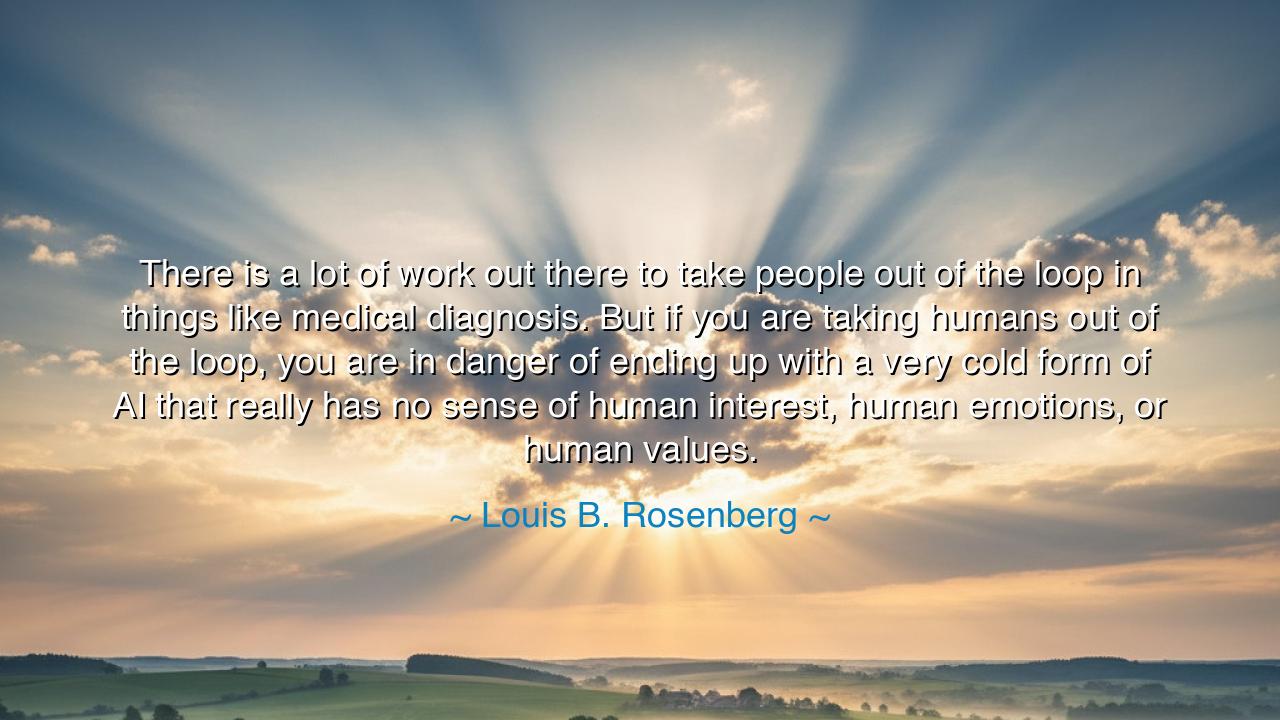
There is a lot of work out there to take people out of the loop
There is a lot of work out there to take people out of the loop in things like medical diagnosis. But if you are taking humans out of the loop, you are in danger of ending up with a very cold form of AI that really has no sense of human interest, human emotions, or human values.






Hear the words of Louis B. Rosenberg, a pioneer in the realms of human-computer interaction, who warns with clarity and foresight: “There is a lot of work out there to take people out of the loop in things like medical diagnosis. But if you are taking humans out of the loop, you are in danger of ending up with a very cold form of AI that really has no sense of human interest, human emotions, or human values.” In this utterance he lifts a beacon, showing us both the promise and peril of our age. For though machines can analyze, they cannot yet feel; they can calculate, but they cannot care.
The origin of this truth lies in the rapid rise of artificial intelligence within medicine. Algorithms now read X-rays, predict disease, and recommend treatments. In their precision, they may surpass the eyes of a human doctor, yet they lack the soul of a healer. For medicine is not only about diagnosis; it is about compassion, about listening to fear, about holding the trembling hand of the sick. Rosenberg warns that if we remove humans entirely from this sacred loop, we risk creating systems that are efficient yet inhuman, accurate yet devoid of mercy.
The ancients would have understood this danger. When physicians in Greece swore the oath of Hippocrates, they did not swear only to knowledge but to values—to act with compassion, to respect the dignity of life, to serve beyond self. A machine, however advanced, cannot swear an oath; it has no conscience, no sense of sorrow or joy. To entrust all of medicine to a machine is to abandon the sacred bond between healer and patient, the bond that transforms treatment into healing.
Consider the story of Ignaz Semmelweis, the physician who discovered that handwashing reduced infection. At first, his evidence was clear, but it was not the numbers alone that changed minds—it was his appeal to compassion, his insistence that mothers were dying needlessly and that physicians must act to save them. A machine might have noted the data, but only a human heart could cry out with the urgency that transformed practice. This story shows that medicine demands not only knowledge, but also the fire of empathy, without which truth lies dormant.
The meaning of Rosenberg’s words is thus both heroic and cautionary. He does not dismiss the power of AI; indeed, he acknowledges its value. But he insists that human beings must remain “in the loop,” guiding and tempering the cold logic of machines with human interest, human emotions, and human values. Without this, we risk building an edifice of medicine that looks strong but is hollow, capable of extending life but not enriching it, capable of treating bodies but not caring for souls.
The lesson for us is clear: technology is a servant, not a master. We must never allow the efficiency of machines to eclipse the compassion of people. In the realm of medical diagnosis, let AI aid the doctor, but let the doctor remain present, speaking with the voice of humanity, bearing the weight of empathy, showing that every patient is not merely a case, but a person. In this balance lies the true future of healing.
Practical action flows from this wisdom. If you are a technologist, design systems that keep human beings engaged, rather than excluded. If you are a physician, embrace the tools of AI but never forget that your presence, your words, and your empathy are medicines in themselves. If you are a citizen, advocate for healthcare that honors dignity and values, not only speed and accuracy. Let us demand that technology reflects not only intelligence but humanity.
Thus Rosenberg’s words stand as a warning to future generations. We must walk boldly into the age of machines, but with our eyes fixed on the truth: that human values are the core of medicine. Without them, healing becomes cold calculation. With them, even the mightiest machine becomes not a rival, but a partner in the eternal work of compassion. This is the teaching we must carry forward, for the sake of all who will one day sit trembling in the presence of their healer.






AAdministratorAdministrator
Welcome, honored guests. Please leave a comment, we will respond soon